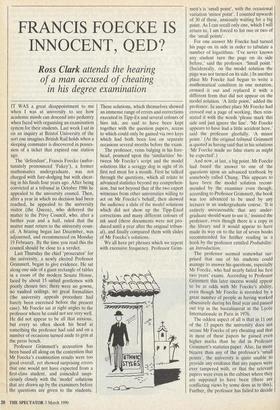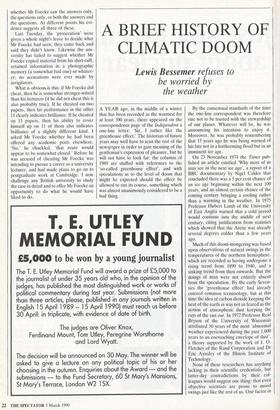FRANCIS FOECKE IS INNOCENT, QED?
Ross Clark attends the hearing
of a man accused of cheating in his degree examination
IT WAS a great disappointment to me when I was at university to see how academic minds can descend into pedantry when faced with organising an examination system for their students. Last week I sat in on an inquiry at Bristol University of the sort one imagines British Rail holds when a sleeping commuter is discovered in posses- sion of a ticket that expired one station ago.
The 'defendant', Francis Foecke (unfor- tunately pronounced `Fakey'), a former mathematics undergraduate, was not charged with fare-dodging but with cheat- ing in his finals four years ago. After being convicted at a tribunal in October 1986 he appealed to the university council. Then, after a year in which no decision had been reached, he appealed to the university visitor (the Queen), who deferred the matter to the Privy Council, who, after a further year and a half, ruled that the matter must return to the university coun- cil. A hearing began last December,: was adjourned, and recommenced on Monday 19 February. By the time you read this the council should be close to a verdict.
Last Thursday the chief 'prosecutor' for the university, a newly elected Professor Grimmett, began to give evidence. He sat along one side of a giant rectangle of tables in a room of the modern Senate House, faced by about 15 suited gentlemen with poorly chosen ties; there were no gowns, no vaulted ceilings, no great formalities (the university appeals procedure had barely been exercised before the present case). Mr Foecke sat at right angles to the professor where he could not see very well. He did not appear to be all that anxious, but every so often shook his head at something the professor had said and on a number of occasions turned aside to grin at the press bench.
Professor Grimmett's accusation has been based all along on the contention that Mr Foecke's examination results were too good overall, yet showed surprising errors that one would not have expected from a first-class student, and coincided suspi- ciously closely with the 'model' solutions that are drawn up by the examiners before the questions are given to the students. These solutions, which themselves showed an immense range of errors and corrections executed in Tipp-Ex and several colours of biro ink, are said to have been kept together with the question papers, access to which could only be gained via two keys which had both been lost on separate occasions several months before the exam.
The professor, veins bulging in his fore- head, pounced upon the 'similarities' be- tween Mr Foecke's script and the model solutions like a scraggy dog in sight of its first red meat for a month. First he talked through the questions, which all relate to advanced statistics beyond my comprehen- sion, but not beyond that of the two expert witnesses from other universities willing to act on Mr Foecke's behalf, then showed the audience a slide of the model solutions which did not show up the Tipp-Exed corrections and many different colours of ink used (these documents were not pro- duced until a year after the original tribun- al), and finally compared them with slides of Mr Foecke's solutions.
We all have pet phrases which we repeat with excessive frequency. Professor Grim- mett's is 'small point', with the occasional variation 'minor point', I counted upwards of 30 of these, anxiously waiting for a big point. As I can recall only one, which I will return to, I am forced to list one or two of the 'small points'.
For one answer Mr Foecke had turned his page on its side in order to tabulate a number of logarithms. 'I've never known any student turn the page on its side before,' said the professor. 'Small point.' (Incidentally, on the model solution the page was not turned on its side.) In another place Mr Foecke had begun to write a mathematical condition in one notation, crossed it out and replaced it with a different form that did not appear on the model solution. 'A little point,' added the professor. In another place Mr Foecke had crossed out a page of working, then rein- stated it with the words 'please mark this side and just ignore the line'. 'Mr Foecke appears to have had a little accident here,' said the professor gleefully. 'A minor point.' (At the original tribunal Grimmett is quoted as having said that in his solutions 'Mr Foecke made no false starts as might be expected'.)
And now, at last, a big point. Mr Foecke had based the answer to one of the questions upon an advanced textbook by somebody called Chung. This appears to have been the model solution recom- mended by the examiner even though, according to Professor Grimmett, the book was too advanced to be used by any lecturer in an undergraduate course. 'It is entirely unreasonable that any under- graduate should want to use it,' insisted the professor, even though there is a copy in the library and it would appear to have made its way on to the list of seven books recommended for further reading in a book by the professor entitled Probability: an Introduction.
The professor seemed somewhat sur- prised that one of his students could manage to answer his questions, especially Mr Foecke, who had nearly failed his first two years' exams. According to Professor Grimmett this later success would appear to be at odds with Mr Foecke's ability. even though Mr Foecke is recorded by a great number of people as having worked obsessively during his final year and passed out top in the baccalaureat at the Lye& Internationale in Faris in 1976.
The oddest aspect of all is that in 11 out of the 13 papers the university does not accuse Mr Foecke of any cheating and that in most of these papers he gained even higher marks than he did in Professor Grimmett's statistics paper. Also, far more bizarre than any of the professor's 'small points', the university is quite unable to provide any evidence that any papers were ever tampered with, or that the relevant papers were even in the cabinet where they are supposed to have been (there are conflicting views by some dons as to this). Further, the professor has failed to decide
whether Mr Foecke saw the answers only, the questions only, or both the answers and the questions. At different points his evi- dence suggests all three of these.
Last Tuesday, the 'prosecution' were given a whole night's leave to decide what Mr Foecke had seen; they came back and said they didn't know. Likewise the uni- versity has failed to suggest whether Mr Foecke copied material from his shirt-cuff, retained information in a photographic memory (a somewhat bad one) or whatev- er; no accusations were ever made by invigilators.
What is obvious is this: if Mr Foecke did cheat, then he is somewhat stronger-witted than his lecturers (if he did not cheat this is also probably true). If he cheated on two papers, then his performance in the other 11 clearly indicates brilliance. If he cheated on 13 papers, then his ability to cover himself up on 11 of them also indicates brilliance of a slightly different kind. I asked Mr Foecke whether he had been offered any academic posts elsewhere. 'No,' he chuckled, 'that route would appear to be somewhat closed.' Before he was accused of cheating Mr Foecke was intending to pursue a career as a university lecturer, and had made plans to go on to postgraduate work at Cambridge. I now challenge any British university to study the case in detail and to offer Mr Foecke an opportunity to do what he would have liked to do.



























































 Previous page
Previous page